Unit 2 How often do you exercise 汉译英专练(含解析)人教新目标(Go for it)版英语八年级上册
文档属性
| 名称 | Unit 2 How often do you exercise 汉译英专练(含解析)人教新目标(Go for it)版英语八年级上册 | 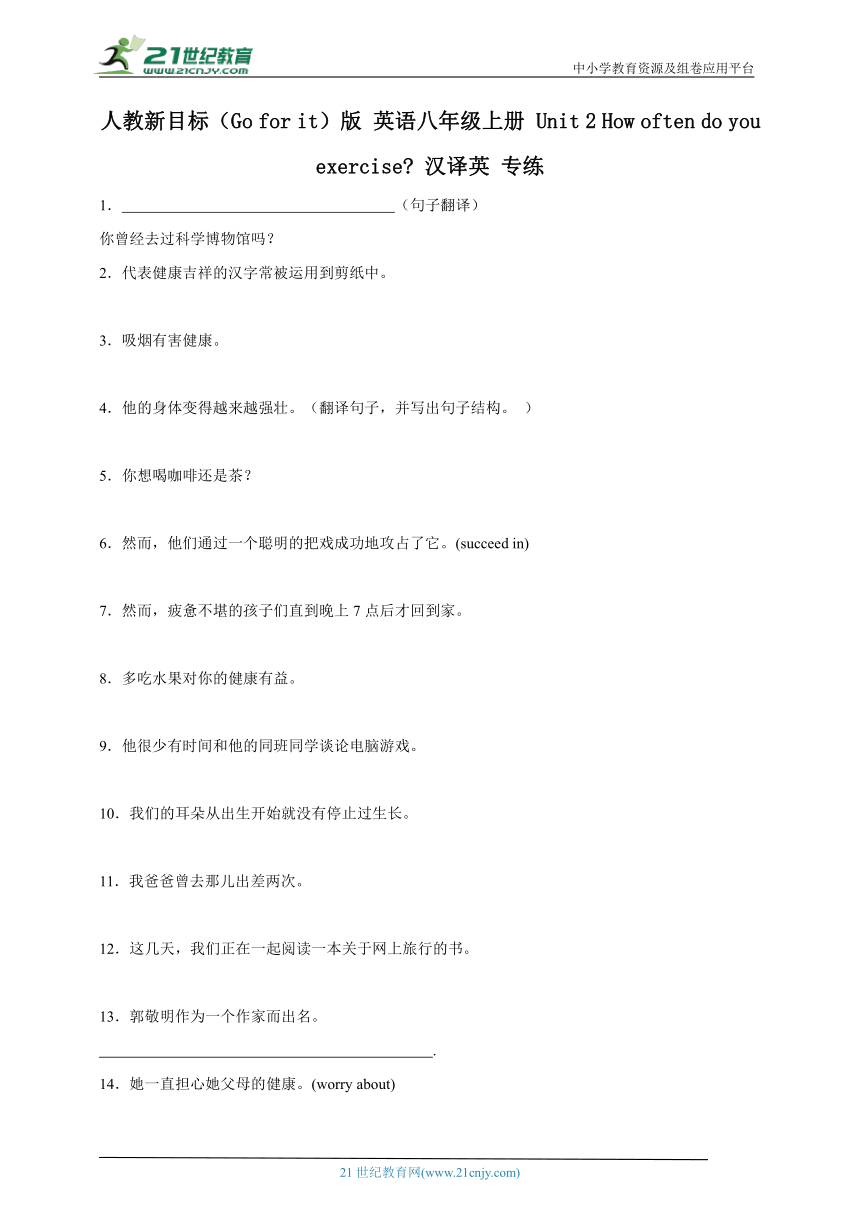 | |
| 格式 | docx | ||
| 文件大小 | 286.9KB | ||
| 资源类型 | 试卷 | ||
| 版本资源 | 人教新目标(Go for it)版 | ||
| 科目 | 英语 | ||
| 更新时间 | 2023-09-25 18:58:33 | ||
图片预览

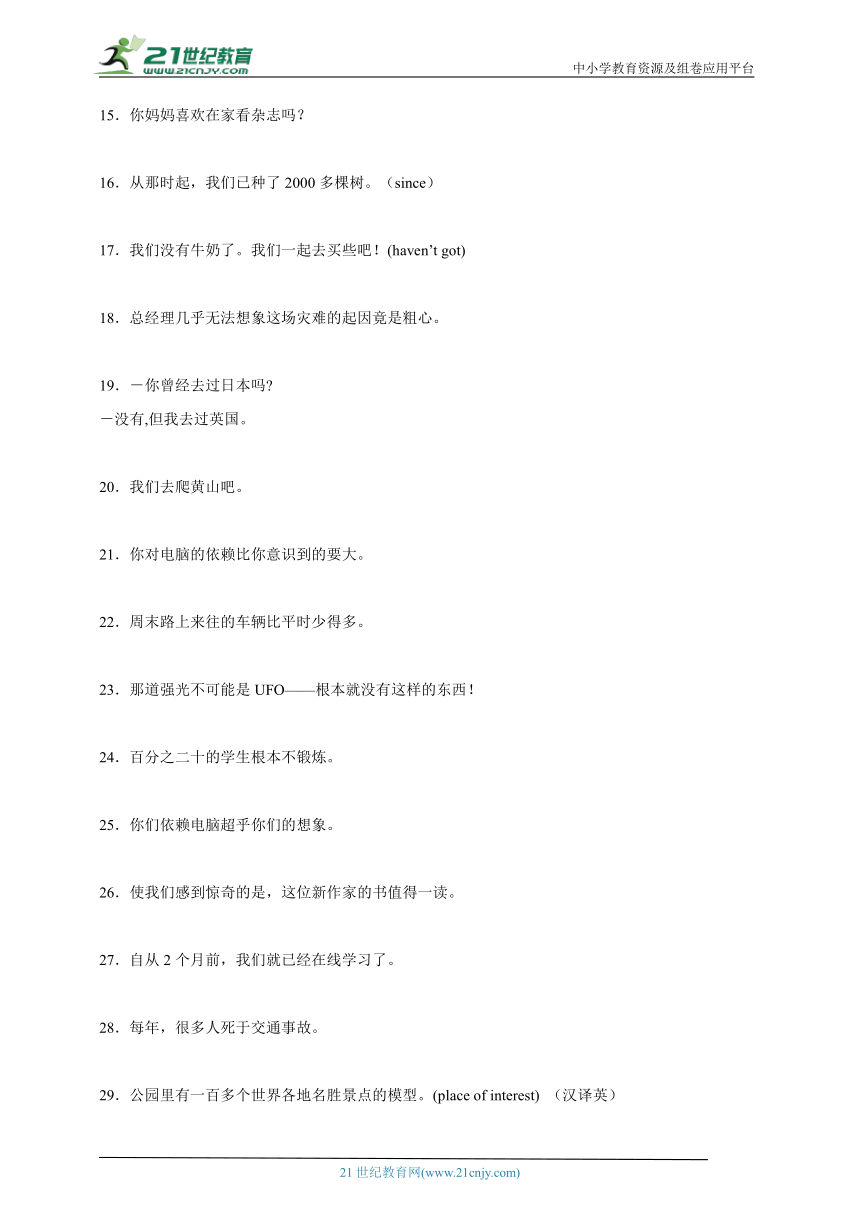
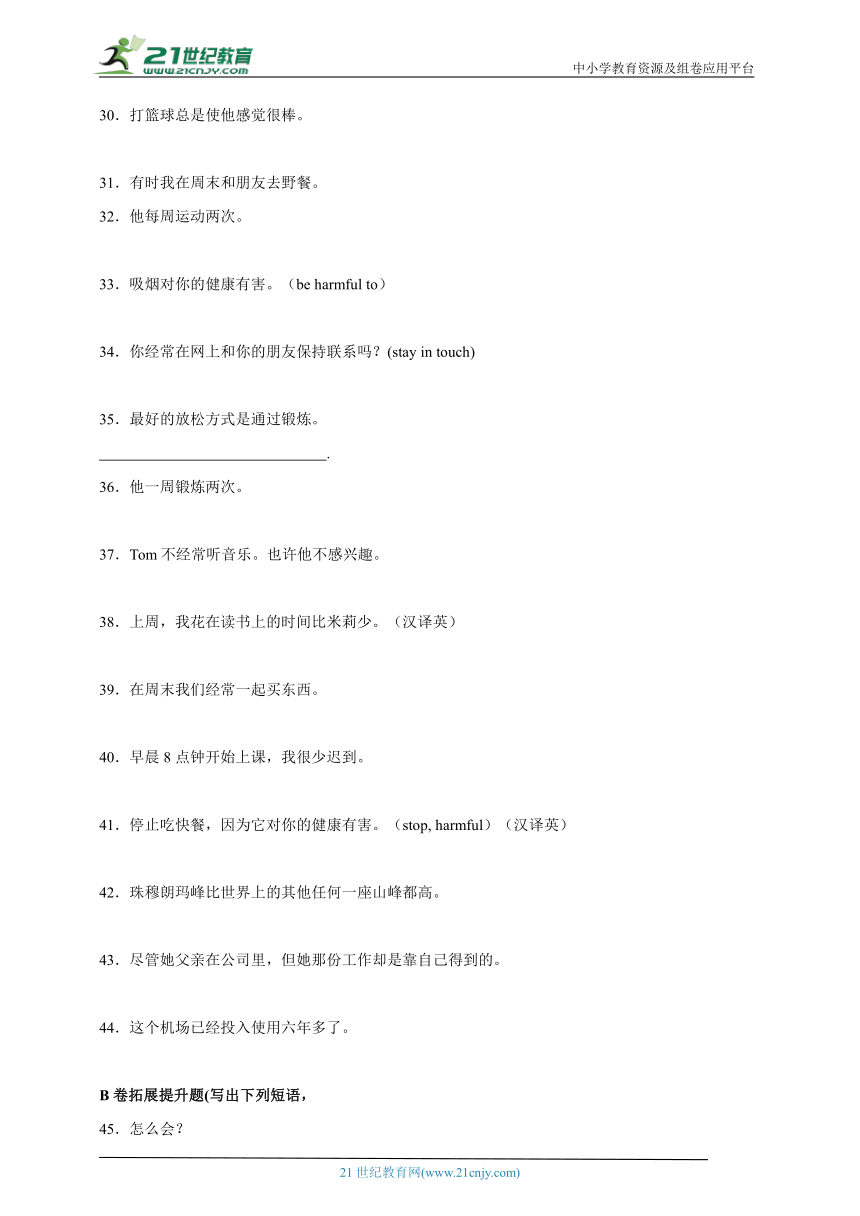
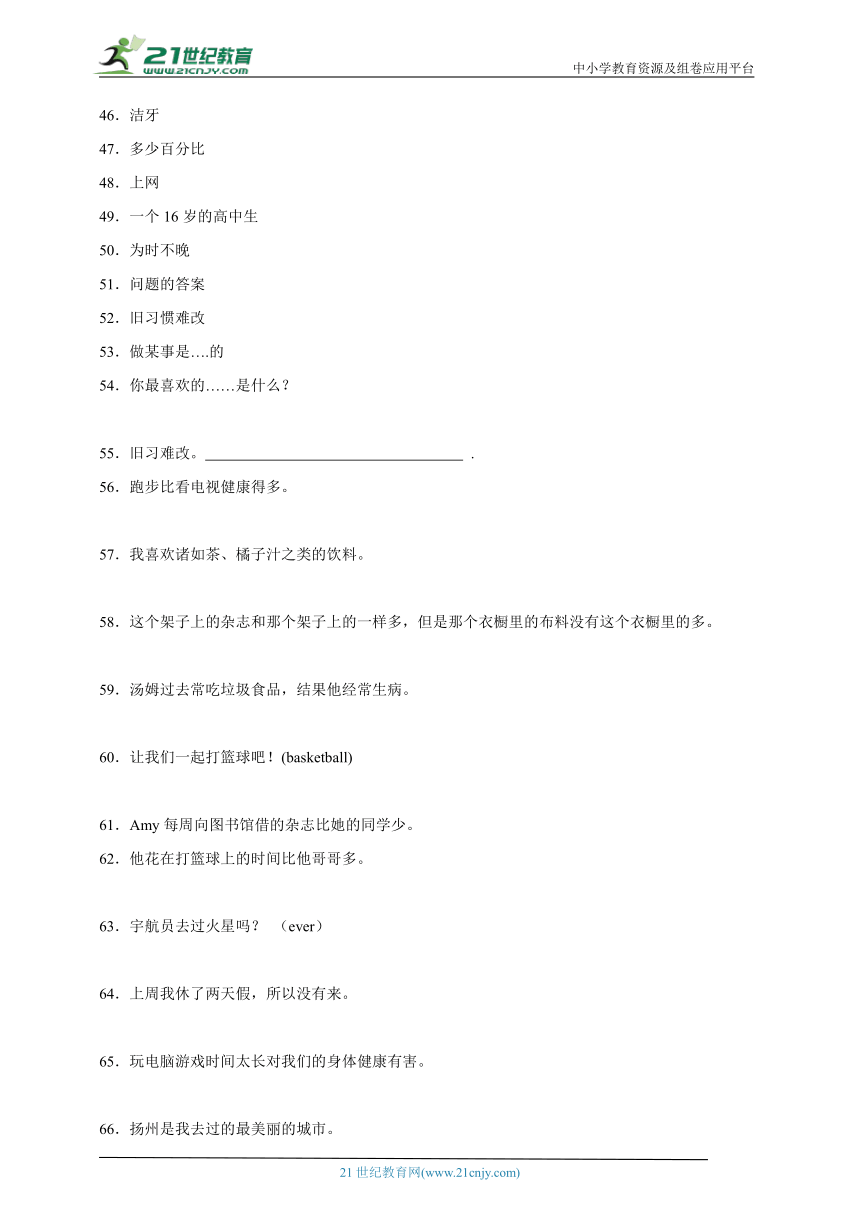
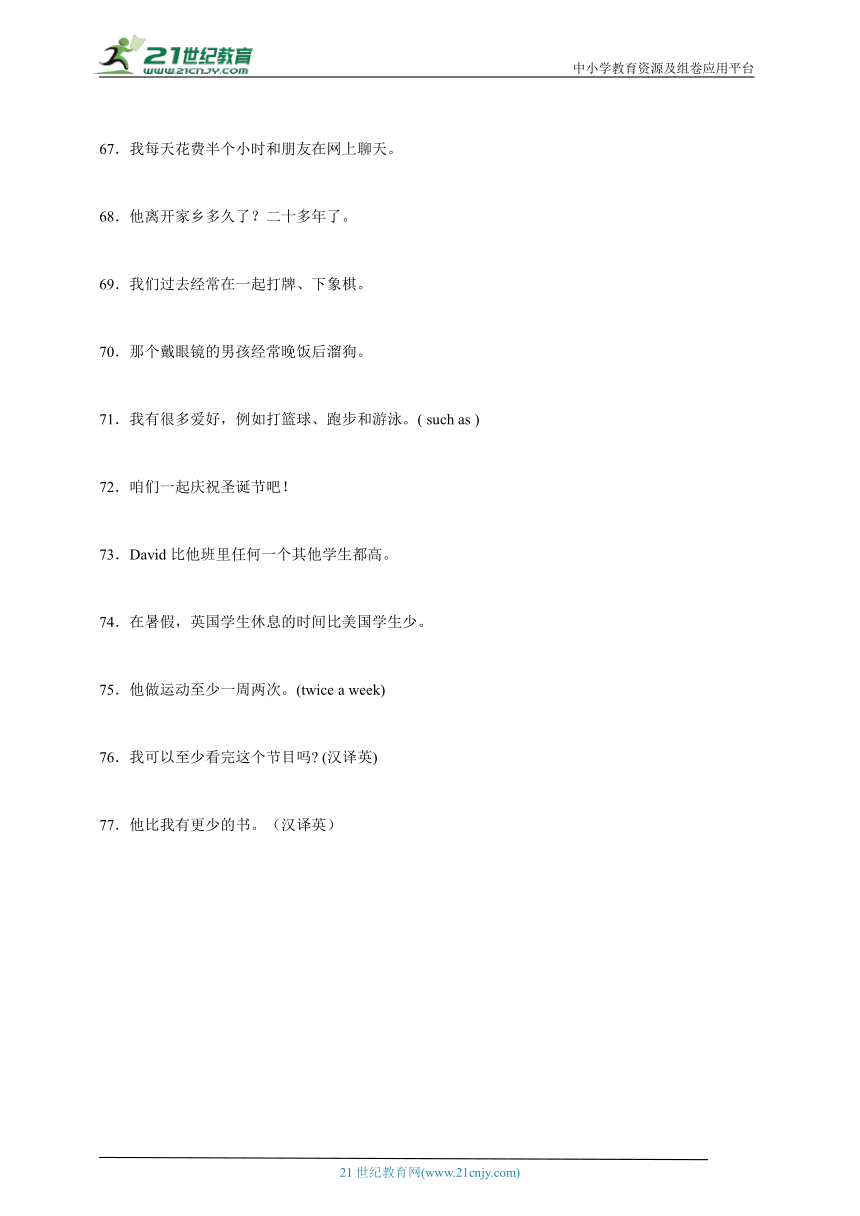
文档简介
中小学教育资源及组卷应用平台
人教新目标(Go for it)版 英语八年级上册 Unit 2 How often do you exercise 汉译英 专练
1. (句子翻译)
你曾经去过科学博物馆吗?
2.代表健康吉祥的汉字常被运用到剪纸中。
3.吸烟有害健康。
4.他的身体变得越来越强壮。(翻译句子,并写出句子结构。 )
5.你想喝咖啡还是茶?
6.然而,他们通过一个聪明的把戏成功地攻占了它。(succeed in)
7.然而,疲惫不堪的孩子们直到晚上7点后才回到家。
8.多吃水果对你的健康有益。
9.他很少有时间和他的同班同学谈论电脑游戏。
10.我们的耳朵从出生开始就没有停止过生长。
11.我爸爸曾去那儿出差两次。
12.这几天,我们正在一起阅读一本关于网上旅行的书。
13.郭敬明作为一个作家而出名。
.
14.她一直担心她父母的健康。(worry about)
15.你妈妈喜欢在家看杂志吗?
16.从那时起,我们已种了2000多棵树。(since)
17.我们没有牛奶了。我们一起去买些吧!(haven’t got)
18.总经理几乎无法想象这场灾难的起因竟是粗心。
19.-你曾经去过日本吗
-没有,但我去过英国。
20.我们去爬黄山吧。
21.你对电脑的依赖比你意识到的要大。
22.周末路上来往的车辆比平时少得多。
23.那道强光不可能是UFO——根本就没有这样的东西!
24.百分之二十的学生根本不锻炼。
25.你们依赖电脑超乎你们的想象。
26.使我们感到惊奇的是,这位新作家的书值得一读。
27.自从2个月前,我们就已经在线学习了。
28.每年,很多人死于交通事故。
29.公园里有一百多个世界各地名胜景点的模型。(place of interest) (汉译英)
30.打篮球总是使他感觉很棒。
31.有时我在周末和朋友去野餐。
32.他每周运动两次。
33.吸烟对你的健康有害。(be harmful to)
34.你经常在网上和你的朋友保持联系吗?(stay in touch)
35.最好的放松方式是通过锻炼。
.
36.他一周锻炼两次。
37.Tom不经常听音乐。也许他不感兴趣。
38.上周,我花在读书上的时间比米莉少。(汉译英)
39.在周末我们经常一起买东西。
40.早晨8点钟开始上课,我很少迟到。
41.停止吃快餐,因为它对你的健康有害。(stop, harmful)(汉译英)
42.珠穆朗玛峰比世界上的其他任何一座山峰都高。
43.尽管她父亲在公司里,但她那份工作却是靠自己得到的。
44.这个机场已经投入使用六年多了。
B卷拓展提升题(写出下列短语,
45.怎么会?
46.洁牙
47.多少百分比
48.上网
49.一个16岁的高中生
50.为时不晚
51.问题的答案
52.旧习惯难改
53.做某事是….的
54.你最喜欢的……是什么?
55.旧习难改。 .
56.跑步比看电视健康得多。
57.我喜欢诸如茶、橘子汁之类的饮料。
58.这个架子上的杂志和那个架子上的一样多,但是那个衣橱里的布料没有这个衣橱里的多。
59.汤姆过去常吃垃圾食品,结果他经常生病。
60.让我们一起打篮球吧!(basketball)
61.Amy每周向图书馆借的杂志比她的同学少。
62.他花在打篮球上的时间比他哥哥多。
63.宇航员去过火星吗? (ever)
64.上周我休了两天假,所以没有来。
65.玩电脑游戏时间太长对我们的身体健康有害。
66.扬州是我去过的最美丽的城市。
67.我每天花费半个小时和朋友在网上聊天。
68.他离开家乡多久了?二十多年了。
69.我们过去经常在一起打牌、下象棋。
70.那个戴眼镜的男孩经常晚饭后溜狗。
71.我有很多爱好,例如打篮球、跑步和游泳。( such as )
72.咱们一起庆祝圣诞节吧!
73.David比他班里任何一个其他学生都高。
74.在暑假,英国学生休息的时间比美国学生少。
75.他做运动至少一周两次。(twice a week)
76.我可以至少看完这个节目吗 (汉译英)
77.他比我有更少的书。(汉译英)
参考答案:
1.Have you ever been to a science museum
【详解】根据标点“?”可知,句子为疑问句。you你,have ever been to曾经去过,a science museum科学博物馆。句子为现在完成时,改为疑问句将have提至句首且大写首字母,主语you位于其后,故填Have you ever been to a science museum
2.Chinese characters for health and good luck are usually used in paper cuttings.
【详解】Chinese characters“汉字”;for“(表示对象、用途等)给”;health and good luck“健康吉祥”;usually“通常”;use“使用”,和主语是被动关系,句子是一般现在时,主语是复数,所以被动语态结构为are done;in paper cutting“在剪纸中”。故填Chinese characters for health and good luck are usually used in paper cuttings.
3.Smoking is harmful to health.
【详解】smoke“吸烟”,动词作主语用动名词形式smoking,首字母大写;be harmful to“对……有害”,描述事实时态用一般现在时,主语是第三人称单数,be动词用is;health“健康”。故填Smoking is harmful to health.
4.His body gets stronger and stronger. (主语+系动词+表语)
【详解】他的身体:his body,作主语;变得:get,系动词;越来越强壮:stronger and stronger,作表语;句子用一般现在时,主语是单数,谓语动词用单数。分析句子可知,句子结构是“主语+系动词+表语”。故填His body gets stronger and stronger.(主语+系动词+表语)。
5.Would you like to drink coffee or tea
【详解】根据题干可知本句应为选择疑问句,此处表示请求或建议的句型应使用“Would you like sth”,tea茶;coffee咖啡;drink喝。故填Would you like to drink coffee or tea
6.However, they succeeded in capturing it through a clever trick.
【详解】however“然而”,副词放在句首;succeed in doing sth“成功做某事”;capture it“攻占它”;through“通过”;a clever trick“一个聪明的把戏”,描述过去发生的事情,句子用一般过去时,故填However, they succeeded in capturing it through a clever trick.
7.However, the tired children don’t get home until after 7:00 p.m.
【详解】however然而,后用逗号隔开,not...until直到……才……;get home回家,故填However, the tired children don’t get home until after 7:00 p.m.
8.Eating more fruit is good for your health.
【详解】eat more fruit“多吃水果”,be good for“对……有益”,health“健康”,此处用动名词短语作主语,谓语用第三人称单数形式,故填Eating more fruit is good for your health.
9.He seldom has time to talk about the computer games with his classmates.
【详解】he他,作主语;seldom很少,作状语;have time to do sth有时间做某事;talk about the computer games with his classmates和他的同班同学谈论电脑游戏。根据句意,时态是一般现在时,主语是第三人称单数,动词用三单。故填He seldom has time to talk about the computer games with his classmates.
10.Our ears never stop growing from birth.
【详解】我们的耳朵:our ears;从没有:never;停止做某事:stop doing sth.;生长:grow;从出生:from birth。根据语境可知,此题为一般现在时。故填Our ears never stop growing from birth.
11.My father has been there on business twice.
【详解】my father“我爸爸”,作主语;be there“去那儿”;on business“出差”;twice“两次”。本句为现在完成时,主语是单数,因此谓语用has been。故填My father has been there on business twice.
12.These days, we are reading a book about travelling online/online trip/online travelling together.
【详解】根据“正在一起阅读”可知用现在进行时,其结构为am/is/are doing。这几天these days;我们we,其后接be动词are;一起together;阅读read,其现在分词形式为reading;一本关于……的书a book about ...,后接名词或动名词;网上旅行travelling online/online trip/online travelling。故填These days, we are reading a book about travelling online/online trip/online travelling together.
13.Guo Jingming is famous as a writer.
【详解】根据汉语意思可知,时态是一般现在时,主语Guo Jingming,be famous as“作为……而出名”,a writer“一个作家”,故填Guo Jingming is famous as a writer。
14.She has been worried about her parents' health.
【详解】根据句意可知,该句应用现在完成时,表示过去发生的动作持续到现在,用have/has +过去分词,主语为She,助动词用has;be worried about是固定短语,“为……担心”;her parents’名词所有格,修饰health。故填She has been worried about her parents' health.
15.Does your mother like reading magazines at home
【详解】your mother你妈妈,like doing sth喜欢做某事,at home在家,read magazines看杂志。根据句意,本句是一般疑问句,主语是第三人称单数,助动词用does。故填Does your mother like reading magazines at home
16.Since then, we have planted more than 2,000 trees.
【详解】since then“从那时起”;plant more than 2,000 trees“种了2000多棵树”。由句意可知时态是现在完成时。we接have+过去分词。故填Since then, we have planted more than 2,000 trees.
17.We haven’t got any milk. Let’s go and buy some together.
【详解】我们“we”,作主语;没有“haven’t got”,作谓语;牛奶“any milk”,作宾语;因此第一句为We haven’t got any milk;第二句是let’s开头的祈使句,去买些“go and buy some”,一起“together”;因此,第二句为Let’s go and buy some together。综上,故填We haven’t got any milk. Let’s go and buy some together.
18.The general manager can hardly imagine the cause of the disaster is carelessness.
【详解】general manager总经理;hardly几乎不;imagine想象;disaster灾难;短语the cause of……的起因;carelessness粗心。结合句意,故答案为The general manger can hardly imagine the cause of the disaster is carelessness.
19.—Have you ever been to Japan
—No, but I have been to England.
【详解】have been to指去过,ever指曾经,是现在完成时的标志,故句子应用现在完成时,故应填—Have you ever been to Japan —No, but I have been to England.。
20.Let’s climb up the Yellow Mountain/Huangshan.
【详解】让我们let’s,爬climb,let’s后加动词原形。故填Let’s climb up the Yellow Mountain/Huangshan.。
21.Your dependence on computers is more than you realize.
【详解】“依赖”用dependence;“对……的依赖”用介词on;“比……”用比较连词than;“意识到”用realize;“要大”就是“要多”的意思用more。主语“Your dependence on computers”是第三人称单数形式,谓语用第三人称单数形式,故填Your dependence on computers is more than you realize.
22.There is much less traffic on the roads at the weekends than usual.
【详解】周末at the weekends;路上on the roads;来往的车辆(交通)traffic;比than,用于比较;平时usual;少得多much less。本句是存现句,需用there be结构,遵循就近原则;traffic是不可数名词,be需用is;根据句意结构和汉语提示,可知填There is much less traffic on the roads at the weekends than usual.。
23.That bright light can’t be a UFO—there is no such thing!
【详解】那道强光that bright light;不可能是can’t be;根本就没有这样的东西there is no such thing,用there be句型表示“有”,故填:That bright light can’t be a UFO—there is no such thing!
24.Twenty percent of the students don’t exercise at all.
【详解】“百分之二十的学生”译为“twenty percent of the students”;“锻炼”译为“exercise”;“一点也不”译为“not…at all”,分析句子可知,该句时态为一般现在时,主语为“twenty percent of the students”,是复数,故需借助动词“do”构成否定,故填Twenty percent of the students don’t exercise at all.
25.You rely on computers more than you realize./You depend on computers more than you realize./You rely on computers beyond your imagination./You depend on computers beyond your imagination.
【详解】rely on或depend on都表示“依赖”;computer“电脑”,可数名词,这里要用复数形式;more than或beyond都表示“超乎”;realize“意识到”;imagination“想象”;句子的时态为一般现在时,主语为You,所以动词用原形。故填You rely on computers more than you realize./You depend on computers more than you realize./You rely on computers beyond your imagination./You depend on computers beyond your imagination.
26.To our surprise, the new writer’s book is worth reading.
【详解】to one’s surprise令某人惊讶的是,短语to our surprise表示使我们吃惊的是;writer作家,book书,修饰名词,用名词所有格,短语be worth doing sth.表示值得做某事;the new writer’s book这位新作家的书,作主语,谓语动词用第三人称单数形式;主语根据汉语提示,故填To our surprise, the new writer’s book is worth reading.
27.We have been studying online since 2 months ago.
【详解】根据汉语可知,此处用现在完成进行时“have been doing”;since“自从”,2 months ago“2个月前”;we“我们”,have been studying online“已经在线学习”。故填We have been studying online since 2 months ago.
28.Every year, many people die in traffic accidents.
【详解】每年:every year;很多人:many people;死于交通事故:die in traffic accident,此处表示复数含义,所以使用名词复数。故填Every year, many people die in traffic accidents.
29.There are models of more than 100 places of interest from all over the world in the park.
【详解】这是“there be +名词+ 地点”的结构。be动词与离得最近的名词的单复数保持一致。表达“模型”用复数名词“models”。表达“一百多个”用“more than 100”。表达“名胜景点”用复数形式“places of interest”。句子用名词所有格形式“models of more than 100 places of interest”。表达“世界各地”用介词“from”和短语“all over the world”。表达“公园里”用“in the park”作地点状语。故填There are models of more than 100 places of interest from all over the world in the park.
30.Playing basketball always makes him (feel) great.
【详解】根据汉语可知,时态是一般现在时,“打篮球”play basketball,作主语,应用其动名词形式,谓语动词用三单形式;“总是”always;“使某人做某事”make sb do或用make sb adj.表示“使某人如何”,“感觉很棒”feel great,feel可省略。故填Playing basketball always makes him (feel) great.
31.Sometimes I go on a picnic/picnics with friends at weekends.
【详解】句意:有时我在周末和朋友去野餐。根据go on a picnic /picnics 去野餐, at weekends在周末;故答案是Sometimes I go on a picnic/picnics with friends at weekends。
32.He exercises twice a week.
【详解】他:he;运动:exercise;每周两次:twice a week。结合语境可知,此题为一般现在时,主语he是第三人称单数,所以谓语动词exercise要用第三人称单数形式exercises。故填He exercises twice a week.
33.Smoking is harmful to your health.
【详解】smoking“抽烟”,动名词作主语;be harmful to“对……有害”;your health“你的健康”。动名词作主语,be动词用is。故填Smoking is harmful to your health.
34.Do you often stay in touch with your friends online/on the Internet
【详解】“你”you;“经常”often;“与……保持联系”stay in touch with;“你的朋友”your friends;“在网上”online/on the Internet。根据句意可知句子时态用一般现在时,本句为一般疑问句,主语是you,一般疑问句需要在句前加助动词do,后面的谓语动词用原形。故填Do you often stay in touch with your friends online/on the Internet
35.The best way to relax is through exercise
【详解】the best way to relax“最好的放松方式”,through exercise“通过锻炼”,陈述客观事实用一般现在时,句子为主系表结构,谓语用is。故填The best way to relax is through exercise。
36.He exercises twice a week./He does sports twice a week.
【详解】他:he;锻炼:exercise/do sports;一周两次:twice a week。结合语境,此题为一般现在时,主语he是第三人称单数,谓语动词用三单形式,即excises/does sports,故填He exercises twice a week./He does sports twice a week.
37.Tom doesn’t often listen to music. Maybe he’s not interested in it.
【详解】often经常;listen to music听音乐;maybe也许,副词,置于句首,首字母大写;be interested in对……感兴趣。根据汉语意思,可知为一般现在时,故填Tom doesn’t often listen to music. Maybe he’s not interested in it.
38.I spent less time reading books than Millie last week.
【详解】根据时间状语“上周last week”,可知句子时态用一般过去时;spend time doing sth.“花费时间做某事”,spend的过去式是spent;“读书”read books,这里用其动名词形式reading;“较少的时间”less time;than“比”,后接人名Millie;故填I spent less time reading books than Millie last week.
39.On weekends we often do some shopping together.
【详解】在周末:on weekends;我们:we;经常:often;一起:together;买东西:do some shopping。结合语境可知,此题为一般现在时,又因为主语是复数人称,动词需用原形。故填On weekends we often do some shopping together.
40.Classes start/begin at 8 a.m., and I am seldom late.
【详解】classes“课”,复数名词,表示泛指,作主语,谓语动词用原形,start/begin“开始”,at 8 a.m.“在早上八点”,具体的钟点前用介词at,I“我”,作主语,seldom“很少”,副词,be late“迟到”,主语是I,be动词用am,两个简单句用and连接。故填Classes start/begin at 8 a.m., and I am seldom late.
41.Stop eating fast food, because it is harmful to your health.
【详解】stop doing sth“停止做某事”,eat fast food“吃快餐”,because“因为”,引导原因状语从句,be harmful to“对……有害”,your health“你的健康”,从句用一般现在时,主句是祈使句,以动词原形开头。故填Stop eating fast food, because it is harmful to your health.
42.Mount Qomolangma is higher than any other mountain in the world.
【详解】本句要用到比较级句型“比较级+than+any other+名词单数+比较范围”。珠穆朗玛峰:Mount Qomolangma;高:high;世界上:in the world;山峰:mountain。故填Mount Qomolangma is higher than any other mountain in the world.
43.Although her father is in the company, she got the job on her own.
【详解】根据句意可知,时态是一般过去时。although尽管,her father is in the company她父亲在公司里,she她,got the job on her own那份工作却是靠自己得到的。故填Although her father is in the company, she got the job on her own.
44.The airport has been in use for more than six years.
【详解】六年多:more than six years,时间段前加介词for,此处句子使用现在完成时have/has done,且动词用延续性动词,be in use“在使用中”,主语“the airport”是单数,助动词用has。故填The airport has been in use for more than six years.
45.How come , 46.teeth cleaning, 47.what percent, 48.go online/ use the Internet, 49.a 16-year-old high school student; 50.before it’s too late; 51.the answer to the question; 52.old habits die hard; 53.It’s adj. to do sth.; 54.What do you like best /What’s your favorite
【解析】45.How come 意为“为什么 (怎么会这样 )”;How come 的用法大部分就等于 why,但是它的用法没有像 why 那么广, 它通常是用在你觉得奇怪, 而问为什么的时候。故填:How come
46.tooth名词,牙齿;teeth名词复数;clean动词,打扫;cleaning是动名词;固定搭配 teeth cleaning,意为“洁牙”。 故填:teeth cleaning。
47.What疑问代词,什么;percent名词,百分之...;what percent,多少百分比.故填:what percent。
48.Online,意为“在线的;联网的;联机的”,go online,上网;use动词,使用;Internet名词,互联网;固定短语go online/ use the Internet,意为“上网”。故填:go online/ use the Internet。
49.16-year-old,意为“16岁的”,相当于形容词;high school student,中学生、高中生。 故填:a 16-year-old high school student。
50.before连词,在...之前;too late太晚;Before it’s too late,为时不晚。故填:before it’s too late。
51.answer名词,答案;to介词,...的;the question问题;固定短语the answer to the question问题的答案。故填:the answer to the question。
52.old形容词,老的;habits 名词复数,习惯;die动词,死;hard副词,困难地;old habits die hard,意为“ 旧习惯难改”。 故填:old habits die hard。
53.固定句型It’s adj. to do sth.,意为“做某事是….的”;it代词,它,作形式主语;to do sth动词不定式作真正的主语。故填:It’s adj. to do sth.。
54.like best,意为“最喜欢”;favorite形容词或名词,最喜欢的;what疑问代词,什么。 故填:What do you like best /What’s your favorite 。
55.Old habits die hard
【详解】旧习old habits;难改die hard 。Old habits die hard是谚语,根据句意结构和中英文提示,可知填Old habits die hard。
56.Running is much healthier than watching TV.
【详解】跑步:run,动词,作主语应用动名词形式;比……健康得多:much healthier than;看电视:watch TV,than后应用动词的动名词形式,故填Running is much healthier than watching TV.
57.I like drinks such as tea, orange juice and so on.
【详解】由句意可知句子时态为一般现在时,句子的主干是“我喜欢饮料”,译为“I like drinks”,“诸如茶和咖啡”作为后置定语用来修饰 drinks(饮料),drink指种类时是可数名词;“诸如”用固定短语“such as”来表示,“茶”的单词是tea, “橘子汁”翻译为orange juice;tea、juice都是不可数名词;and so on“……之类的”;故填I like drinks such as tea, orange juice and so on.
58.There are as many magazines on this shelf as those on that one, but there is not as much cloth in that wardrobe as this one.
【详解】there be“有”;as…as“和……一样多”;many magazines on this shelf“这个架子上的杂志”;those on that one“那个架子上”;but“但是”;much cloth in that wardrobe“那个衣橱里的布料”;this one“这个衣橱里的”,句子是一般现在时,故填There are as many magazines on this shelf as those on that one, but there is not as much cloth in that wardrobe as this one.
59.Tom used to eat junk food. As a result, he often fell ill.
【详解】过去常常做某事:used to do sth.,后面接动词原形;吃垃圾食品:eat junk food;经常:often;结果:as a result;生病:fall ill,结合语境可知,时态是一般过去时,故填Tom used to eat junk food. As a result, he often fell ill。
60.Let’s play basketball together!
【详解】让某人干某事:let sb. do sth.;我们:us,宾格代词;let和us缩写为let’s,句首首字母大写;打篮球:play basketball,此处用动词原形,一起:together,是副词,故填Let’s play basketball together!
61.Amy borrows fewer magazines from the library than her classmates every week.
【详解】Amy每周向图书馆借的杂志比她的同学少。根据fewer更好少的,修饰可数名词的复数;borrow---from---从---借---;故答案是Amy borrows fewer magazines from the library than her classmates every week。
62.He spends more time playing basketball than his brother.
【详解】sb spend some time doing sth某人花多长时间做某事,故此题花更多的时间打篮球spend more time playing basketball;than比;他哥哥his brother。根据语境可知,此题为一般现在时。主语是第三人称单数he,放在句首首字母大写。谓语动词用第三人称单数形式spends。故填He spends more time playing basketball than his brother。
63.Have astronauts ever been to Mars
【详解】astronaut“宇航员”,根据句意可知用复数,表示一类事物;ever“曾经”;Mars“火星”;根据句意可知用现在完成时have/has been to sp. 表示“去过某地”, 主语是复数,助动词用have,一般疑问句把have提前,ever放在过去分词之前。故填Have astronauts ever been to Mars
64.I had two days off last week, so I didn’t come.
【详解】have...off休假,根据last week上周,句子用一般过去时,故填I had two days off last week, so I didn’t come.
65.Playing computer games for too long is bad for our health.
【详解】play computer games“玩电脑游戏”,动词短语,作主语,play用动名词形式playing,首字母大写;for too long“太长时间”,介词for用于时间段前;be bad for“对……有害”,主语是动名词短语,时态是一般现在时,be动词用is;our health“我们的身体健康”。故填Playing computer games for too long is bad for our health.
66.Yangzhou is the most beautiful city that I have ever been to.
【详解】主句为“扬州是最美丽的城市”,“我去过的”作定语修饰“最美丽的城市”。先行词city被形容词最高级the most beautiful修饰,关系代词用that。根据“去过”可知,表示去了某地回来了,用have been to,故填Yangzhou is the most beautiful city that I have ever been to。
67.I spend half an hour chatting with friends online every day.
【详解】我:I;某人花费时间做某事:sb.spend time(in)doing sth.;半小时:half an hour;聊天:chat with sb.;朋友:friend;网上:online;每天:every day,时间状语位于句末。由“每天”可知,句子为一般现在时,又因spend后接动词ing形式,故chat变成chatting。故填I spend half an hour chatting with friends online every day.
68.How long has he been away from his hometown For more than 20 years.
【详解】how long“多长时间”,引导特殊疑问句,对“for+时间段”提问;时态是现在完成时,结构是have/has done,主语是第三人称单数,故将助动词has提到主语前;句中谓语为延续性动作;离开:be away from;他的家乡:his hometown;二十多年:more than 20 years。故填How long has he been away from his hometown For more than 20 years.
69.We used to play cards and Chinese chess together.
【详解】我们:we;过去经常做某事:used to do sth.;在一起:together;打牌:play cards;下象棋:play Chinese chess。故填We used to play cards and Chinese chess together.
70.The boy with/wearing glasses often walks the dog after supper/dinner. 或The boy with/wearing glasses often takes the dog for a walk after supper/dinner.
【详解】那个男孩:the boy;戴眼镜的:with/wearing glasses;经常:often;在晚饭后:after supper/dinner;遛狗:walk the dog/take the dog for a walk。结合语境可知,句子时态为一般现在时。此处“戴眼镜的”修饰“那个男孩”,要放在其后作后置定语,the boy中首字母t要大写,由于句子主语是“那个男孩”,为第三人称单数,故谓语动词“遛狗”要用三单形式,即walks the dog或takes the dog for a walk,“在晚饭后”为时间状语,放于句末,“经常”表频率,放在谓语动词前。故填The boy with/wearing glasses often walks the dog after supper/dinner. 或The boy with/wearing glasses often takes the dog for a walk after supper/dinner.
71.I have many hobbies, such as playing basketball, running and swimming.
【详解】I我,have有,many hobbies很多爱好,such as例如,playing basketball打篮球,running跑步,and和,swimming游泳。故填I have many hobbies, such as playing basketball, running and swimming.
72.Let’s celebrate Christmas together!
【详解】Let’s+动词原形“让我们一起……”,celebrate…together“一起庆祝”,Christmas“圣诞节”,故填Let’s celebrate Christmas together!
73.David is taller than any other student in his class.
【详解】any other student“任何一个其他学生”;be taller than any other student“比任何一个其他学生都高”;in his class“他班里”。David是第三人称单数,be动词需用is;故填David is taller than any other student in his class.
74.During the summer holidays, British students take less time off than American students.
【详解】根据给出中文可知句子时态为一般现在时。在……期间:during;暑假:the summer holidays;英国学生:British students,作主语;休息,抽出一部分时间:take time off,作谓语;比:than;更少的:less;比较对象:American studnets;故填During the summer holidays, British students take less time off than American students.
75.He plays sports at least twice a week.
【详解】he“他”;play sports“做运动”;at least“至少”;twice a week“一周两次”。根据句意用一般现在时,主语he是第三人称单数,谓语动词用第三人称单数形式。故填He plays sports at least twice a week.
76.Could I at least finish watching this show
【详解】根据汉语可知,本句为疑问句,故疑问词提前,想表达委婉语气用could。主语为I,至少:at least;结束做某事:finish doing sth;看节目:watch the show。分析句子可知,watch the show作finish的宾语。故填Could I at least finish watching this show
77.He has fewer books than me.
【详解】他:he;有:have,此处主语he是第三人称单数,谓语动词应用has;更少的书:fewer books,few修饰可数名词,此处修饰可数名词books,应用few,且两者进行比较,应用比较级fewer;比:than;我:I,此处“我”作宾语,应用宾格形式。故填He has fewer books than me.
21世纪教育网 www.21cnjy.com 精品试卷·第 2 页 (共 2 页)
21世纪教育网(www.21cnjy.com)
人教新目标(Go for it)版 英语八年级上册 Unit 2 How often do you exercise 汉译英 专练
1. (句子翻译)
你曾经去过科学博物馆吗?
2.代表健康吉祥的汉字常被运用到剪纸中。
3.吸烟有害健康。
4.他的身体变得越来越强壮。(翻译句子,并写出句子结构。 )
5.你想喝咖啡还是茶?
6.然而,他们通过一个聪明的把戏成功地攻占了它。(succeed in)
7.然而,疲惫不堪的孩子们直到晚上7点后才回到家。
8.多吃水果对你的健康有益。
9.他很少有时间和他的同班同学谈论电脑游戏。
10.我们的耳朵从出生开始就没有停止过生长。
11.我爸爸曾去那儿出差两次。
12.这几天,我们正在一起阅读一本关于网上旅行的书。
13.郭敬明作为一个作家而出名。
.
14.她一直担心她父母的健康。(worry about)
15.你妈妈喜欢在家看杂志吗?
16.从那时起,我们已种了2000多棵树。(since)
17.我们没有牛奶了。我们一起去买些吧!(haven’t got)
18.总经理几乎无法想象这场灾难的起因竟是粗心。
19.-你曾经去过日本吗
-没有,但我去过英国。
20.我们去爬黄山吧。
21.你对电脑的依赖比你意识到的要大。
22.周末路上来往的车辆比平时少得多。
23.那道强光不可能是UFO——根本就没有这样的东西!
24.百分之二十的学生根本不锻炼。
25.你们依赖电脑超乎你们的想象。
26.使我们感到惊奇的是,这位新作家的书值得一读。
27.自从2个月前,我们就已经在线学习了。
28.每年,很多人死于交通事故。
29.公园里有一百多个世界各地名胜景点的模型。(place of interest) (汉译英)
30.打篮球总是使他感觉很棒。
31.有时我在周末和朋友去野餐。
32.他每周运动两次。
33.吸烟对你的健康有害。(be harmful to)
34.你经常在网上和你的朋友保持联系吗?(stay in touch)
35.最好的放松方式是通过锻炼。
.
36.他一周锻炼两次。
37.Tom不经常听音乐。也许他不感兴趣。
38.上周,我花在读书上的时间比米莉少。(汉译英)
39.在周末我们经常一起买东西。
40.早晨8点钟开始上课,我很少迟到。
41.停止吃快餐,因为它对你的健康有害。(stop, harmful)(汉译英)
42.珠穆朗玛峰比世界上的其他任何一座山峰都高。
43.尽管她父亲在公司里,但她那份工作却是靠自己得到的。
44.这个机场已经投入使用六年多了。
B卷拓展提升题(写出下列短语,
45.怎么会?
46.洁牙
47.多少百分比
48.上网
49.一个16岁的高中生
50.为时不晚
51.问题的答案
52.旧习惯难改
53.做某事是….的
54.你最喜欢的……是什么?
55.旧习难改。 .
56.跑步比看电视健康得多。
57.我喜欢诸如茶、橘子汁之类的饮料。
58.这个架子上的杂志和那个架子上的一样多,但是那个衣橱里的布料没有这个衣橱里的多。
59.汤姆过去常吃垃圾食品,结果他经常生病。
60.让我们一起打篮球吧!(basketball)
61.Amy每周向图书馆借的杂志比她的同学少。
62.他花在打篮球上的时间比他哥哥多。
63.宇航员去过火星吗? (ever)
64.上周我休了两天假,所以没有来。
65.玩电脑游戏时间太长对我们的身体健康有害。
66.扬州是我去过的最美丽的城市。
67.我每天花费半个小时和朋友在网上聊天。
68.他离开家乡多久了?二十多年了。
69.我们过去经常在一起打牌、下象棋。
70.那个戴眼镜的男孩经常晚饭后溜狗。
71.我有很多爱好,例如打篮球、跑步和游泳。( such as )
72.咱们一起庆祝圣诞节吧!
73.David比他班里任何一个其他学生都高。
74.在暑假,英国学生休息的时间比美国学生少。
75.他做运动至少一周两次。(twice a week)
76.我可以至少看完这个节目吗 (汉译英)
77.他比我有更少的书。(汉译英)
参考答案:
1.Have you ever been to a science museum
【详解】根据标点“?”可知,句子为疑问句。you你,have ever been to曾经去过,a science museum科学博物馆。句子为现在完成时,改为疑问句将have提至句首且大写首字母,主语you位于其后,故填Have you ever been to a science museum
2.Chinese characters for health and good luck are usually used in paper cuttings.
【详解】Chinese characters“汉字”;for“(表示对象、用途等)给”;health and good luck“健康吉祥”;usually“通常”;use“使用”,和主语是被动关系,句子是一般现在时,主语是复数,所以被动语态结构为are done;in paper cutting“在剪纸中”。故填Chinese characters for health and good luck are usually used in paper cuttings.
3.Smoking is harmful to health.
【详解】smoke“吸烟”,动词作主语用动名词形式smoking,首字母大写;be harmful to“对……有害”,描述事实时态用一般现在时,主语是第三人称单数,be动词用is;health“健康”。故填Smoking is harmful to health.
4.His body gets stronger and stronger. (主语+系动词+表语)
【详解】他的身体:his body,作主语;变得:get,系动词;越来越强壮:stronger and stronger,作表语;句子用一般现在时,主语是单数,谓语动词用单数。分析句子可知,句子结构是“主语+系动词+表语”。故填His body gets stronger and stronger.(主语+系动词+表语)。
5.Would you like to drink coffee or tea
【详解】根据题干可知本句应为选择疑问句,此处表示请求或建议的句型应使用“Would you like sth”,tea茶;coffee咖啡;drink喝。故填Would you like to drink coffee or tea
6.However, they succeeded in capturing it through a clever trick.
【详解】however“然而”,副词放在句首;succeed in doing sth“成功做某事”;capture it“攻占它”;through“通过”;a clever trick“一个聪明的把戏”,描述过去发生的事情,句子用一般过去时,故填However, they succeeded in capturing it through a clever trick.
7.However, the tired children don’t get home until after 7:00 p.m.
【详解】however然而,后用逗号隔开,not...until直到……才……;get home回家,故填However, the tired children don’t get home until after 7:00 p.m.
8.Eating more fruit is good for your health.
【详解】eat more fruit“多吃水果”,be good for“对……有益”,health“健康”,此处用动名词短语作主语,谓语用第三人称单数形式,故填Eating more fruit is good for your health.
9.He seldom has time to talk about the computer games with his classmates.
【详解】he他,作主语;seldom很少,作状语;have time to do sth有时间做某事;talk about the computer games with his classmates和他的同班同学谈论电脑游戏。根据句意,时态是一般现在时,主语是第三人称单数,动词用三单。故填He seldom has time to talk about the computer games with his classmates.
10.Our ears never stop growing from birth.
【详解】我们的耳朵:our ears;从没有:never;停止做某事:stop doing sth.;生长:grow;从出生:from birth。根据语境可知,此题为一般现在时。故填Our ears never stop growing from birth.
11.My father has been there on business twice.
【详解】my father“我爸爸”,作主语;be there“去那儿”;on business“出差”;twice“两次”。本句为现在完成时,主语是单数,因此谓语用has been。故填My father has been there on business twice.
12.These days, we are reading a book about travelling online/online trip/online travelling together.
【详解】根据“正在一起阅读”可知用现在进行时,其结构为am/is/are doing。这几天these days;我们we,其后接be动词are;一起together;阅读read,其现在分词形式为reading;一本关于……的书a book about ...,后接名词或动名词;网上旅行travelling online/online trip/online travelling。故填These days, we are reading a book about travelling online/online trip/online travelling together.
13.Guo Jingming is famous as a writer.
【详解】根据汉语意思可知,时态是一般现在时,主语Guo Jingming,be famous as“作为……而出名”,a writer“一个作家”,故填Guo Jingming is famous as a writer。
14.She has been worried about her parents' health.
【详解】根据句意可知,该句应用现在完成时,表示过去发生的动作持续到现在,用have/has +过去分词,主语为She,助动词用has;be worried about是固定短语,“为……担心”;her parents’名词所有格,修饰health。故填She has been worried about her parents' health.
15.Does your mother like reading magazines at home
【详解】your mother你妈妈,like doing sth喜欢做某事,at home在家,read magazines看杂志。根据句意,本句是一般疑问句,主语是第三人称单数,助动词用does。故填Does your mother like reading magazines at home
16.Since then, we have planted more than 2,000 trees.
【详解】since then“从那时起”;plant more than 2,000 trees“种了2000多棵树”。由句意可知时态是现在完成时。we接have+过去分词。故填Since then, we have planted more than 2,000 trees.
17.We haven’t got any milk. Let’s go and buy some together.
【详解】我们“we”,作主语;没有“haven’t got”,作谓语;牛奶“any milk”,作宾语;因此第一句为We haven’t got any milk;第二句是let’s开头的祈使句,去买些“go and buy some”,一起“together”;因此,第二句为Let’s go and buy some together。综上,故填We haven’t got any milk. Let’s go and buy some together.
18.The general manager can hardly imagine the cause of the disaster is carelessness.
【详解】general manager总经理;hardly几乎不;imagine想象;disaster灾难;短语the cause of……的起因;carelessness粗心。结合句意,故答案为The general manger can hardly imagine the cause of the disaster is carelessness.
19.—Have you ever been to Japan
—No, but I have been to England.
【详解】have been to指去过,ever指曾经,是现在完成时的标志,故句子应用现在完成时,故应填—Have you ever been to Japan —No, but I have been to England.。
20.Let’s climb up the Yellow Mountain/Huangshan.
【详解】让我们let’s,爬climb,let’s后加动词原形。故填Let’s climb up the Yellow Mountain/Huangshan.。
21.Your dependence on computers is more than you realize.
【详解】“依赖”用dependence;“对……的依赖”用介词on;“比……”用比较连词than;“意识到”用realize;“要大”就是“要多”的意思用more。主语“Your dependence on computers”是第三人称单数形式,谓语用第三人称单数形式,故填Your dependence on computers is more than you realize.
22.There is much less traffic on the roads at the weekends than usual.
【详解】周末at the weekends;路上on the roads;来往的车辆(交通)traffic;比than,用于比较;平时usual;少得多much less。本句是存现句,需用there be结构,遵循就近原则;traffic是不可数名词,be需用is;根据句意结构和汉语提示,可知填There is much less traffic on the roads at the weekends than usual.。
23.That bright light can’t be a UFO—there is no such thing!
【详解】那道强光that bright light;不可能是can’t be;根本就没有这样的东西there is no such thing,用there be句型表示“有”,故填:That bright light can’t be a UFO—there is no such thing!
24.Twenty percent of the students don’t exercise at all.
【详解】“百分之二十的学生”译为“twenty percent of the students”;“锻炼”译为“exercise”;“一点也不”译为“not…at all”,分析句子可知,该句时态为一般现在时,主语为“twenty percent of the students”,是复数,故需借助动词“do”构成否定,故填Twenty percent of the students don’t exercise at all.
25.You rely on computers more than you realize./You depend on computers more than you realize./You rely on computers beyond your imagination./You depend on computers beyond your imagination.
【详解】rely on或depend on都表示“依赖”;computer“电脑”,可数名词,这里要用复数形式;more than或beyond都表示“超乎”;realize“意识到”;imagination“想象”;句子的时态为一般现在时,主语为You,所以动词用原形。故填You rely on computers more than you realize./You depend on computers more than you realize./You rely on computers beyond your imagination./You depend on computers beyond your imagination.
26.To our surprise, the new writer’s book is worth reading.
【详解】to one’s surprise令某人惊讶的是,短语to our surprise表示使我们吃惊的是;writer作家,book书,修饰名词,用名词所有格,短语be worth doing sth.表示值得做某事;the new writer’s book这位新作家的书,作主语,谓语动词用第三人称单数形式;主语根据汉语提示,故填To our surprise, the new writer’s book is worth reading.
27.We have been studying online since 2 months ago.
【详解】根据汉语可知,此处用现在完成进行时“have been doing”;since“自从”,2 months ago“2个月前”;we“我们”,have been studying online“已经在线学习”。故填We have been studying online since 2 months ago.
28.Every year, many people die in traffic accidents.
【详解】每年:every year;很多人:many people;死于交通事故:die in traffic accident,此处表示复数含义,所以使用名词复数。故填Every year, many people die in traffic accidents.
29.There are models of more than 100 places of interest from all over the world in the park.
【详解】这是“there be +名词+ 地点”的结构。be动词与离得最近的名词的单复数保持一致。表达“模型”用复数名词“models”。表达“一百多个”用“more than 100”。表达“名胜景点”用复数形式“places of interest”。句子用名词所有格形式“models of more than 100 places of interest”。表达“世界各地”用介词“from”和短语“all over the world”。表达“公园里”用“in the park”作地点状语。故填There are models of more than 100 places of interest from all over the world in the park.
30.Playing basketball always makes him (feel) great.
【详解】根据汉语可知,时态是一般现在时,“打篮球”play basketball,作主语,应用其动名词形式,谓语动词用三单形式;“总是”always;“使某人做某事”make sb do或用make sb adj.表示“使某人如何”,“感觉很棒”feel great,feel可省略。故填Playing basketball always makes him (feel) great.
31.Sometimes I go on a picnic/picnics with friends at weekends.
【详解】句意:有时我在周末和朋友去野餐。根据go on a picnic /picnics 去野餐, at weekends在周末;故答案是Sometimes I go on a picnic/picnics with friends at weekends。
32.He exercises twice a week.
【详解】他:he;运动:exercise;每周两次:twice a week。结合语境可知,此题为一般现在时,主语he是第三人称单数,所以谓语动词exercise要用第三人称单数形式exercises。故填He exercises twice a week.
33.Smoking is harmful to your health.
【详解】smoking“抽烟”,动名词作主语;be harmful to“对……有害”;your health“你的健康”。动名词作主语,be动词用is。故填Smoking is harmful to your health.
34.Do you often stay in touch with your friends online/on the Internet
【详解】“你”you;“经常”often;“与……保持联系”stay in touch with;“你的朋友”your friends;“在网上”online/on the Internet。根据句意可知句子时态用一般现在时,本句为一般疑问句,主语是you,一般疑问句需要在句前加助动词do,后面的谓语动词用原形。故填Do you often stay in touch with your friends online/on the Internet
35.The best way to relax is through exercise
【详解】the best way to relax“最好的放松方式”,through exercise“通过锻炼”,陈述客观事实用一般现在时,句子为主系表结构,谓语用is。故填The best way to relax is through exercise。
36.He exercises twice a week./He does sports twice a week.
【详解】他:he;锻炼:exercise/do sports;一周两次:twice a week。结合语境,此题为一般现在时,主语he是第三人称单数,谓语动词用三单形式,即excises/does sports,故填He exercises twice a week./He does sports twice a week.
37.Tom doesn’t often listen to music. Maybe he’s not interested in it.
【详解】often经常;listen to music听音乐;maybe也许,副词,置于句首,首字母大写;be interested in对……感兴趣。根据汉语意思,可知为一般现在时,故填Tom doesn’t often listen to music. Maybe he’s not interested in it.
38.I spent less time reading books than Millie last week.
【详解】根据时间状语“上周last week”,可知句子时态用一般过去时;spend time doing sth.“花费时间做某事”,spend的过去式是spent;“读书”read books,这里用其动名词形式reading;“较少的时间”less time;than“比”,后接人名Millie;故填I spent less time reading books than Millie last week.
39.On weekends we often do some shopping together.
【详解】在周末:on weekends;我们:we;经常:often;一起:together;买东西:do some shopping。结合语境可知,此题为一般现在时,又因为主语是复数人称,动词需用原形。故填On weekends we often do some shopping together.
40.Classes start/begin at 8 a.m., and I am seldom late.
【详解】classes“课”,复数名词,表示泛指,作主语,谓语动词用原形,start/begin“开始”,at 8 a.m.“在早上八点”,具体的钟点前用介词at,I“我”,作主语,seldom“很少”,副词,be late“迟到”,主语是I,be动词用am,两个简单句用and连接。故填Classes start/begin at 8 a.m., and I am seldom late.
41.Stop eating fast food, because it is harmful to your health.
【详解】stop doing sth“停止做某事”,eat fast food“吃快餐”,because“因为”,引导原因状语从句,be harmful to“对……有害”,your health“你的健康”,从句用一般现在时,主句是祈使句,以动词原形开头。故填Stop eating fast food, because it is harmful to your health.
42.Mount Qomolangma is higher than any other mountain in the world.
【详解】本句要用到比较级句型“比较级+than+any other+名词单数+比较范围”。珠穆朗玛峰:Mount Qomolangma;高:high;世界上:in the world;山峰:mountain。故填Mount Qomolangma is higher than any other mountain in the world.
43.Although her father is in the company, she got the job on her own.
【详解】根据句意可知,时态是一般过去时。although尽管,her father is in the company她父亲在公司里,she她,got the job on her own那份工作却是靠自己得到的。故填Although her father is in the company, she got the job on her own.
44.The airport has been in use for more than six years.
【详解】六年多:more than six years,时间段前加介词for,此处句子使用现在完成时have/has done,且动词用延续性动词,be in use“在使用中”,主语“the airport”是单数,助动词用has。故填The airport has been in use for more than six years.
45.How come , 46.teeth cleaning, 47.what percent, 48.go online/ use the Internet, 49.a 16-year-old high school student; 50.before it’s too late; 51.the answer to the question; 52.old habits die hard; 53.It’s adj. to do sth.; 54.What do you like best /What’s your favorite
【解析】45.How come 意为“为什么 (怎么会这样 )”;How come 的用法大部分就等于 why,但是它的用法没有像 why 那么广, 它通常是用在你觉得奇怪, 而问为什么的时候。故填:How come
46.tooth名词,牙齿;teeth名词复数;clean动词,打扫;cleaning是动名词;固定搭配 teeth cleaning,意为“洁牙”。 故填:teeth cleaning。
47.What疑问代词,什么;percent名词,百分之...;what percent,多少百分比.故填:what percent。
48.Online,意为“在线的;联网的;联机的”,go online,上网;use动词,使用;Internet名词,互联网;固定短语go online/ use the Internet,意为“上网”。故填:go online/ use the Internet。
49.16-year-old,意为“16岁的”,相当于形容词;high school student,中学生、高中生。 故填:a 16-year-old high school student。
50.before连词,在...之前;too late太晚;Before it’s too late,为时不晚。故填:before it’s too late。
51.answer名词,答案;to介词,...的;the question问题;固定短语the answer to the question问题的答案。故填:the answer to the question。
52.old形容词,老的;habits 名词复数,习惯;die动词,死;hard副词,困难地;old habits die hard,意为“ 旧习惯难改”。 故填:old habits die hard。
53.固定句型It’s adj. to do sth.,意为“做某事是….的”;it代词,它,作形式主语;to do sth动词不定式作真正的主语。故填:It’s adj. to do sth.。
54.like best,意为“最喜欢”;favorite形容词或名词,最喜欢的;what疑问代词,什么。 故填:What do you like best /What’s your favorite 。
55.Old habits die hard
【详解】旧习old habits;难改die hard 。Old habits die hard是谚语,根据句意结构和中英文提示,可知填Old habits die hard。
56.Running is much healthier than watching TV.
【详解】跑步:run,动词,作主语应用动名词形式;比……健康得多:much healthier than;看电视:watch TV,than后应用动词的动名词形式,故填Running is much healthier than watching TV.
57.I like drinks such as tea, orange juice and so on.
【详解】由句意可知句子时态为一般现在时,句子的主干是“我喜欢饮料”,译为“I like drinks”,“诸如茶和咖啡”作为后置定语用来修饰 drinks(饮料),drink指种类时是可数名词;“诸如”用固定短语“such as”来表示,“茶”的单词是tea, “橘子汁”翻译为orange juice;tea、juice都是不可数名词;and so on“……之类的”;故填I like drinks such as tea, orange juice and so on.
58.There are as many magazines on this shelf as those on that one, but there is not as much cloth in that wardrobe as this one.
【详解】there be“有”;as…as“和……一样多”;many magazines on this shelf“这个架子上的杂志”;those on that one“那个架子上”;but“但是”;much cloth in that wardrobe“那个衣橱里的布料”;this one“这个衣橱里的”,句子是一般现在时,故填There are as many magazines on this shelf as those on that one, but there is not as much cloth in that wardrobe as this one.
59.Tom used to eat junk food. As a result, he often fell ill.
【详解】过去常常做某事:used to do sth.,后面接动词原形;吃垃圾食品:eat junk food;经常:often;结果:as a result;生病:fall ill,结合语境可知,时态是一般过去时,故填Tom used to eat junk food. As a result, he often fell ill。
60.Let’s play basketball together!
【详解】让某人干某事:let sb. do sth.;我们:us,宾格代词;let和us缩写为let’s,句首首字母大写;打篮球:play basketball,此处用动词原形,一起:together,是副词,故填Let’s play basketball together!
61.Amy borrows fewer magazines from the library than her classmates every week.
【详解】Amy每周向图书馆借的杂志比她的同学少。根据fewer更好少的,修饰可数名词的复数;borrow---from---从---借---;故答案是Amy borrows fewer magazines from the library than her classmates every week。
62.He spends more time playing basketball than his brother.
【详解】sb spend some time doing sth某人花多长时间做某事,故此题花更多的时间打篮球spend more time playing basketball;than比;他哥哥his brother。根据语境可知,此题为一般现在时。主语是第三人称单数he,放在句首首字母大写。谓语动词用第三人称单数形式spends。故填He spends more time playing basketball than his brother。
63.Have astronauts ever been to Mars
【详解】astronaut“宇航员”,根据句意可知用复数,表示一类事物;ever“曾经”;Mars“火星”;根据句意可知用现在完成时have/has been to sp. 表示“去过某地”, 主语是复数,助动词用have,一般疑问句把have提前,ever放在过去分词之前。故填Have astronauts ever been to Mars
64.I had two days off last week, so I didn’t come.
【详解】have...off休假,根据last week上周,句子用一般过去时,故填I had two days off last week, so I didn’t come.
65.Playing computer games for too long is bad for our health.
【详解】play computer games“玩电脑游戏”,动词短语,作主语,play用动名词形式playing,首字母大写;for too long“太长时间”,介词for用于时间段前;be bad for“对……有害”,主语是动名词短语,时态是一般现在时,be动词用is;our health“我们的身体健康”。故填Playing computer games for too long is bad for our health.
66.Yangzhou is the most beautiful city that I have ever been to.
【详解】主句为“扬州是最美丽的城市”,“我去过的”作定语修饰“最美丽的城市”。先行词city被形容词最高级the most beautiful修饰,关系代词用that。根据“去过”可知,表示去了某地回来了,用have been to,故填Yangzhou is the most beautiful city that I have ever been to。
67.I spend half an hour chatting with friends online every day.
【详解】我:I;某人花费时间做某事:sb.spend time(in)doing sth.;半小时:half an hour;聊天:chat with sb.;朋友:friend;网上:online;每天:every day,时间状语位于句末。由“每天”可知,句子为一般现在时,又因spend后接动词ing形式,故chat变成chatting。故填I spend half an hour chatting with friends online every day.
68.How long has he been away from his hometown For more than 20 years.
【详解】how long“多长时间”,引导特殊疑问句,对“for+时间段”提问;时态是现在完成时,结构是have/has done,主语是第三人称单数,故将助动词has提到主语前;句中谓语为延续性动作;离开:be away from;他的家乡:his hometown;二十多年:more than 20 years。故填How long has he been away from his hometown For more than 20 years.
69.We used to play cards and Chinese chess together.
【详解】我们:we;过去经常做某事:used to do sth.;在一起:together;打牌:play cards;下象棋:play Chinese chess。故填We used to play cards and Chinese chess together.
70.The boy with/wearing glasses often walks the dog after supper/dinner. 或The boy with/wearing glasses often takes the dog for a walk after supper/dinner.
【详解】那个男孩:the boy;戴眼镜的:with/wearing glasses;经常:often;在晚饭后:after supper/dinner;遛狗:walk the dog/take the dog for a walk。结合语境可知,句子时态为一般现在时。此处“戴眼镜的”修饰“那个男孩”,要放在其后作后置定语,the boy中首字母t要大写,由于句子主语是“那个男孩”,为第三人称单数,故谓语动词“遛狗”要用三单形式,即walks the dog或takes the dog for a walk,“在晚饭后”为时间状语,放于句末,“经常”表频率,放在谓语动词前。故填The boy with/wearing glasses often walks the dog after supper/dinner. 或The boy with/wearing glasses often takes the dog for a walk after supper/dinner.
71.I have many hobbies, such as playing basketball, running and swimming.
【详解】I我,have有,many hobbies很多爱好,such as例如,playing basketball打篮球,running跑步,and和,swimming游泳。故填I have many hobbies, such as playing basketball, running and swimming.
72.Let’s celebrate Christmas together!
【详解】Let’s+动词原形“让我们一起……”,celebrate…together“一起庆祝”,Christmas“圣诞节”,故填Let’s celebrate Christmas together!
73.David is taller than any other student in his class.
【详解】any other student“任何一个其他学生”;be taller than any other student“比任何一个其他学生都高”;in his class“他班里”。David是第三人称单数,be动词需用is;故填David is taller than any other student in his class.
74.During the summer holidays, British students take less time off than American students.
【详解】根据给出中文可知句子时态为一般现在时。在……期间:during;暑假:the summer holidays;英国学生:British students,作主语;休息,抽出一部分时间:take time off,作谓语;比:than;更少的:less;比较对象:American studnets;故填During the summer holidays, British students take less time off than American students.
75.He plays sports at least twice a week.
【详解】he“他”;play sports“做运动”;at least“至少”;twice a week“一周两次”。根据句意用一般现在时,主语he是第三人称单数,谓语动词用第三人称单数形式。故填He plays sports at least twice a week.
76.Could I at least finish watching this show
【详解】根据汉语可知,本句为疑问句,故疑问词提前,想表达委婉语气用could。主语为I,至少:at least;结束做某事:finish doing sth;看节目:watch the show。分析句子可知,watch the show作finish的宾语。故填Could I at least finish watching this show
77.He has fewer books than me.
【详解】他:he;有:have,此处主语he是第三人称单数,谓语动词应用has;更少的书:fewer books,few修饰可数名词,此处修饰可数名词books,应用few,且两者进行比较,应用比较级fewer;比:than;我:I,此处“我”作宾语,应用宾格形式。故填He has fewer books than me.
21世纪教育网 www.21cnjy.com 精品试卷·第 2 页 (共 2 页)
21世纪教育网(www.21cnjy.com)
同课章节目录
- Unit 1 Where did you go on vacation?
- Section A
- Section B
- Unit 2 How often do you exercise?
- Section A
- Section B
- Unit 3 I'm more outgoing than my sister.
- Section A
- Section B
- Unit 4 What's the best movie theater?
- Section A
- Section B
- Unit 5 Do you want to watch a game show?
- Section A
- Section B
- Unit 6 I'm going to study computer science.
- Section A
- Section B
- Unit 7 Will people have robots?
- Section A
- Section B
- Unit 8 How do you make a banana milk shake?
- Section A
- Section B
- Unit 9 Can you come to my party?
- Section A
- Section B
- Unit 10 If you go to the party, you'll have a grea
- Section A
- Section B
